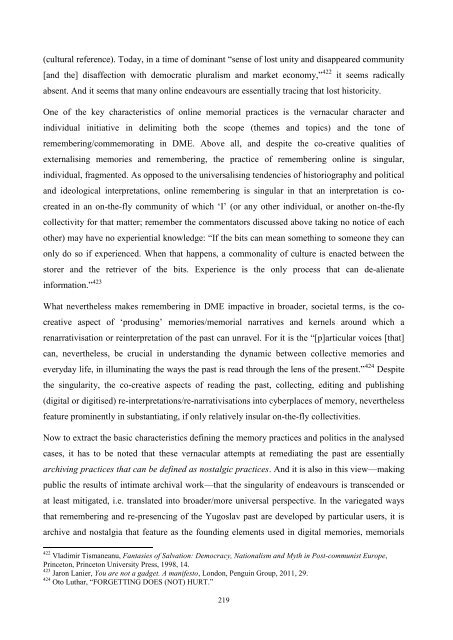UNIVERSITY OF NOVA GORICA GRADUATE SCHOOL ...
UNIVERSITY OF NOVA GORICA GRADUATE SCHOOL ...
UNIVERSITY OF NOVA GORICA GRADUATE SCHOOL ...
You also want an ePaper? Increase the reach of your titles
YUMPU automatically turns print PDFs into web optimized ePapers that Google loves.
(cultural reference). Today, in a time of dominant ―sense of lost unity and disappeared community<br />
[and the] disaffection with democratic pluralism and market economy,‖ 422 it seems radically<br />
absent. And it seems that many online endeavours are essentially tracing that lost historicity.<br />
One of the key characteristics of online memorial practices is the vernacular character and<br />
individual initiative in delimiting both the scope (themes and topics) and the tone of<br />
remembering/commemorating in DME. Above all, and despite the co-creative qualities of<br />
externalising memories and remembering, the practice of remembering online is singular,<br />
individual, fragmented. As opposed to the universalising tendencies of historiography and political<br />
and ideological interpretations, online remembering is singular in that an interpretation is cocreated<br />
in an on-the-fly community of which ‗I‘ (or any other individual, or another on-the-fly<br />
collectivity for that matter; remember the commentators discussed above taking no notice of each<br />
other) may have no experiential knowledge: ―If the bits can mean something to someone they can<br />
only do so if experienced. When that happens, a commonality of culture is enacted between the<br />
storer and the retriever of the bits. Experience is the only process that can de-alienate<br />
information.‖ 423<br />
What nevertheless makes remembering in DME impactive in broader, societal terms, is the cocreative<br />
aspect of ‗produsing‘ memories/memorial narratives and kernels around which a<br />
renarrativisation or reinterpretation of the past can unravel. For it is the ―[p]articular voices [that]<br />
can, nevertheless, be crucial in understanding the dynamic between collective memories and<br />
everyday life, in illuminating the ways the past is read through the lens of the present.‖ 424 Despite<br />
the singularity, the co-creative aspects of reading the past, collecting, editing and publishing<br />
(digital or digitised) re-interpretations/re-narrativisations into cyberplaces of memory, nevertheless<br />
feature prominently in substantiating, if only relatively insular on-the-fly collectivities.<br />
Now to extract the basic characteristics defining the memory practices and politics in the analysed<br />
cases, it has to be noted that these vernacular attempts at remediating the past are essentially<br />
archiving practices that can be defined as nostalgic practices. And it is also in this view—making<br />
public the results of intimate archival work—that the singularity of endeavours is transcended or<br />
at least mitigated, i.e. translated into broader/more universal perspective. In the variegated ways<br />
that remembering and re-presencing of the Yugoslav past are developed by particular users, it is<br />
archive and nostalgia that feature as the founding elements used in digital memories, memorials<br />
422 Vladimir Tismaneanu, Fantasies of Salvation: Democracy, Nationalism and Myth in Post-communist Europe,<br />
Princeton, Princeton University Press, 1998, 14.<br />
423 Jaron Lanier, You are not a gadget. A manifesto, London, Penguin Group, 2011, 29.<br />
424 Oto Luthar, ―FORGETTING DOES (NOT) HURT.‖<br />
219

















